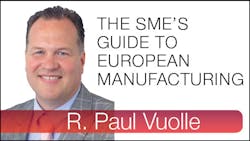In an increasingly globalized world, and while I am doing business across the Atlantic, I am very pleased to write this blog “The SME's Guide to European Manufacturing.”
My plan is to write about what U.S. small- and medium-sized manufacturers need to know about the status, strategies, operations and challenges of European manufacturing SMEs.
From east to west and north to south, Europe is in many ways a very inhomogeneous continent, which is especially true for the SME manufacturing segment. For American manufacturing SMEs, Europe represents a still untapped, high-potential market.
Germany continues to be the manufacturing leader in Europe and, in certain technological areas, a global leader as well; it is still the steam engine that is driving Europe's economy. Indeed, whether we like it or not, Europe’s economic well-being is currently dependent upon the performance of this one country. In the long term, the dependency is not sustainable, and major improvements must happen so that, for instance, France, UK, Italy and Spain will contribute more to the equation.
The Nordic region has traditionally been strong in process industries, due to the pulp and paper industry and the Norwegian oil & gas industry, which, in turn, has originated several successful process instrumentation companies.
The UK, unfortunately, long ago lost large parts of its manufacturing segment, which was replaced by the financial industry. However, the tables seem to be slowly turning around again for the UK, as France is losing some manufacturing entrepreneurs to the UK.
Southern Europe, like Italy and Spain, are very different. Both are very strong in agricultural products and food processing. However, Italy, particularly northern Italy, has very strong family-owned SMEs. These SMEs range from rubber manufacturing to high-companies. This is a very good region to look for business partners, especially for American companies.
Eastern Europe, which has long been in the shadows of China and Asia, is slowly rising, as the European manufacturing industry is making sizable investments there. One prominent example is Fiat, which is investing $1 billion in a car manufacturing plant in Serbia -- a huge investment for the Balkan region.
Eastern Europe as a manufacturing region is also itself a very inhomogeneous region. While Poland has always been strong in heavy manufacturing like metal and shipbuilding, the Czech Republic traditionally has had a wide variety of industry segments ranging from turbine manufacturing to high accuracy instruments.
In summary, North America and Europe combined are huge markets for any product--and this combined market is a big opportunity for both European and American SMEs.
About the Author
R. Paul Vuolle Blog
CEO
R. Paul Vuolle's blog "The SME's Guide to European Manufacturing," has moved. You'll find his latest ideas and commentary on SME European Manufacturing on IndustryWeek's IdeaXchange.
You'll find more articles written by Paul at http://www.industryweek.com/blog/smes-guide-european-manufacturing.
R. Paul Vuolle, CEO of Bellevue SME Advisors GmbH in Switzerland and Germany, works actively with small and medium (SME) size manufacturing companies in Europe in SCM/Outsourcing, logistics, turnaround and restructuring, market expansion, as well as succession planning and financing. He also frequently supports technology start- ups in building up their business.
Paul has over 20 years operational industry experience in engineering, electronics, industrial automation, building automation, investment goods like electrical drives, automatic test & measurement systems, HV Transformer production systems. During his career he has worked in manufacturing industries in supply chain management, outsourcing, logistics, production, R&D and successfully selling to international large key accounts. Paul has also run a sizeable amount of M&A transactions in numerous countries around the world.
He has built up his experience working in various leadership positions and functions in large corporations, such as ABB, and having executive positions in medium-size family companies and as a technology entrepreneur.
Paul is MSc. E.E. from Swiss Federal Institute of Technology in Zürich as well as BSc.E.E. from Helsinki Institute of Technology.
Paul is a long time member of IEEE and of its Industrial Applications Society.
